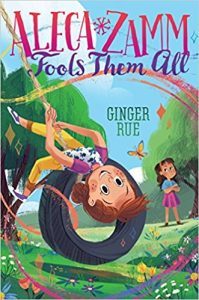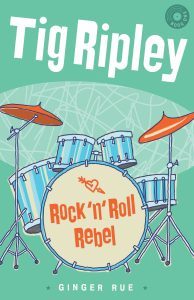Ginger Rue's Blog
April 30, 2018
Good Question!
A blog reader wrote, “I saw your post about the worth of a literary agent. And, I agree. However, I can’t get an agent to even accept a sample of my novel. No one will give me a chance, so I am stuck. I know I need an agent to move forward yet I can’t get one! Any advice?”
After overcoming the shock that someone actually read my blog, I decided I would do a post responding to this excellent question.
If you’re having trouble landing an agent, here are a few things you might consider….
1. Is my writing strong enough? If you’re as impatient as I am, you want to get this publication ball rolling! But patience pays off. Make sure that your work is as strong as possible before you ask a professional to represent you. How do you make your work stronger? I’d suggest joining a critique group or signing up for a writing class (in person or online). And when people are kind enough to give you honest feedback, listen to them! I almost never agree to read anyone else’s WIP…first and foremost because I just don’t have the time. And second because I find that most people don’t want honest criticism. Most just want to be told how talented they are. I actually had an aspiring writer I’d never met hang up on me as I was going over his manuscript with him over the phone. He was a friend of a friend and I’d read his book as a favor to said mutual friend. What a waste of everyone’s time. If someone reads your book, listen with an open mind to what he/she has to say.
2. Is my work marketable? If no agent is interested in your book, it doesn’t necessarily mean your writing stinks. Agents have to be able to sell books to publishers, and some concepts are just difficult to market. If a publisher doesn’t know how to market a book, they won’t buy it. Agents have a good idea which publishers want which kinds of books, and if they think they can’t find a home for your project, they probably won’t take you on. Example: I have a manuscript that never sold because it was Christian in theme but had some edgy plot elements. What a nightmare for marketing. Secular publishers don’t want Christian themes and Christian publishers were afraid the plot points might offend their audience. So guess what? That book never saw the light of day and probably never will. Gotta move on to the next one!
3. How’s my pitch letter? If you don’t write a killer pitch letter, you likely won’t land an agent. For excellent pointers on how to write a query letter, I always refer people to Nathan Bransford’s blog. Actually, pretty much anything you want to know about writing and publishing is covered somewhere in Nathan’s archives. And he’s a hoot to read, so you can’t go wrong checking him out.
4. Do you have an elevator pitch? This is what my screenwriter friend calls the one-liner for his scripts. Stuff like, “This script is JAWS meets DOWNTON ABBEY!” (Wow, I totally want to see that!) If you can compare your book to other successful books, be sure to do that in your query letter.
5. Am I pitching the right agents? Agents get a lot of pitches that are a waste of everyone’s time. There’s no point in pitching a sci-fi thriller to a cookbook agent. So do your homework. Check out the acknowledgments pages of books that are similar to yours. Chances are, the author thanked his/her agent. When you pitch him/her, be sure to mention how your book is like one he/she represented. The agent will be impressed that you did your research and will probably take your pitch letter more seriously.
Hope this helps! Good luck and thanks again for reading!
April 26, 2018
Why I’m Not Especially Crazy about Book Signings
When I published my first novel in 2009, my publisher set up several book signings for me at a chain of bookstores. At the first one, in my hometown, maybe 50 or 60 people showed up. All people I knew. And that my parents knew. Most all of them bought books, and I signed them. It was kind of fun. Well, sort of.
The whole evening, I kept having this nagging feeling that the folks who’d been kind enough to show up did so only because they felt obligated. “It’s Lois’s daughter; we have to go,” I could hear someone saying to a grumbling husband in the car. I ended up feeling almost guilty about the whole thing, even though, technically, the signing was a success and the bookseller was pleased.
When I went to some of the other stores on the list, in towns where I had no friends, it was pretty much an exercise in humility. Maybe one or two people would stop at my table, out of sheer pity, but to be honest, I hadn’t felt that shunned since I was in college and a department store hired me to spray perfume on people walking in. I learned quickly that most people do NOT want a stranger to spray them with perfume. Or sign a book for them. Unless you’re a “name” author, maybe it’s just not worth it.
The same night I sat at my signing table like the lonely Maytag repair man, the book store was giving out numbers for a signing the next day. Giving out NUMBERS. For the NEXT DAY. The authors of the book in question were a married couple who hosted a cooking show on network television. People felt like they knew them. They’d spent time with them in their living rooms, in a manner of speaking. They wanted to say hi in person to someone they felt was a friend.
I accepted the reality that there are TV people with cookbooks and there are obscure people with novels.
And probably only one of those two groups should worry about book signings.
What do you think?
February 10, 2018
Thank you, TODAY!
What a treat for Aleca Zamm to be included in the TODAY Show’s roundup of great Valentine’s Day gifts for kids!
January 16, 2018
Why a Good Agent Is Worth Every Penny

This is my agency. They rock!
A new writer friend of mine asked me recently if I thought it might be a good idea to try to publish a book without the help of an agent because, after all, an agent will take 15% of your money. Here’s a brief summary of my response to her question: NO.
As I told my friend, a good agent is worth every penny, and here’s why:
1. They’re your first line of defense. If you plan to be in this business for any length of time, you’re going to come up with a lot of ideas. And guess what? Not all of them will be good ones. If you have an agent, you can run the ideas by him/her before you go to the trouble of writing an entire manuscript, only to have publishers tell you no thanks. I usually run my new ideas past my agent before I start writing. If she thinks an idea is interesting, I write 10,000 words. Then I send the partial manuscript to her and we see if it’s working. If it’s not, I don’t throw good words after bad; I move on to something else.
2. They know what’s selling. Good agents have their finger on the pulse of the publishing industry. They know what sorts of topics/themes/genres are in demand at any given time. What a drag it would be to write a vampire book only to learn that publishers are sick to death of vampires. (This is a hypothetical…maybe vampires are back again? I don’t know…ask your agent.) This is not to say that a fantastic book won’t sell no matter what the topic (you should definitely write about what interests you instead of trying to jump on a trend), but at some level, you do have to think of publishing as a business, because it is one.
3. They help you to be taken seriously. Many publishing houses won’t even read un-agented manuscripts. I am sure that some successful authors go it alone, but I just think that having an agent gives you a certain sense of credibility from the get-go. It shows you’ve already been vetted if a reputable agent it is behind you.
4. They know who’s looking for what. Good agents know editors at publishing houses pretty well. They spend time cultivating relationships so that they know what each editor wants at any given time. Your agent can direct you to write something he/she knows an editor is looking for, or can steer your manuscript towards the editor who was just recently wishing for such a find. Think about it: you can blindly send out your manuscript to dozens of editors, from your email address that may wind up in the junk folder, or an agent can send a targeted email to someone he/she knows, with a message like, “I think this may be the middle grade thriller you’ve been looking for.”
5. They are your bad cop. One nice thing about having an agent is that, when things go bad, they really earn that 15%. You want to have a lovely, conflict-free relationship with your publishing house, so if a conflict does arise, you get to be the good cop. Your agent will handle all the unpleasant stuff.
6. They will probably negotiate a better deal for you. Chances are that your agent can negotiate a better advance and terms for you than you could for yourself, so that 15% doesn’t wind up being as big a deal as you might first imagine. Also, haggling about money is so distasteful and ruins your whole good cop thing from number five.
7. They understand contracts. Holy cow…have you ever tried to read a publishing contract? I don’t need that kind of stress in my life. You’ll probably have to pay a lawyer to make sure you’re not signing over your firstborn…unless you have an agent, who knows these contracts backward and forward. Good agents also have no problem crossing out certain clauses they don’t like–something I wouldn’t at all feel comfortable doing.
8. They’re your partner in your career. This is more of an intangible, I guess, but for me, it’s so nice to have my agent (whom I absolutely adore) to ride this roller coaster with me. A good agent will want to see your career flourish and will help you get there…and sometimes give you a much-needed pep talk when you’re ready to throw in the towel.
These are just a few reasons off the top of my head. Do you have other reasons why a good agent is worth every penny? If so, please share!
January 1, 2018
Is Life Experience Overrated?
 When I was a young college student in creative writing classes, I thought, “Wow, my professors have so much life experience! They are so interesting!” I had no idea that they were probably looking at all of us and thinking, “Oh, to be young again!”
When I was a young college student in creative writing classes, I thought, “Wow, my professors have so much life experience! They are so interesting!” I had no idea that they were probably looking at all of us and thinking, “Oh, to be young again!”
“Write what you know” is a common phrase tossed about in writing courses. And I’m sure there’s something to it. But now that I’m older and have plenty of life experiences (some I wish I could erase), I find it sort of funny that my latest book series (the third book comes out tomorrow!) is based on a story I wrote when I was 12 years old. In fact, I often find myself trying to get back into my 12-year-old frame of mind so that I can have a better sense of what will be entertaining to my readers.
All of this leads me to the question, Is Life Experience Overrated?
All I know is that I’ve got no shortage of hard-won wisdom, yet I’m still writing about pantsing the school principal, so you tell me….
November 24, 2017
There’s a Marsupial in My Manuscript!
A little writing hack that might save you some time:
When you get to a stopping point for the day, or when you get to a part of your manuscript that isn’t working, insert a marsupial.
By this I mean actually type in the word MARSUPIAL–or some other word you’re not likely to use in your book–in all caps. (If you’re writing a book about marsupials, definitely find another word.) Later, when you come back to your book to write some more, you can do a quick search for your unusual word and save yourself the time of having to scroll through to find your last stopping point.
Just a little something that has saved me some time over the years. Anyone else have a writing hack to share?
November 5, 2017
A Temptation Writers Must Avoid
 Sometimes when you’re working on a new book, you get so excited that you’re just dying to talk about it. Especially if you come up with a character based on someone you know. The temptation is strong to tell that person, “Guess what? I’m basing a character on you!” Well, let me give you some advice: DON’T.
Sometimes when you’re working on a new book, you get so excited that you’re just dying to talk about it. Especially if you come up with a character based on someone you know. The temptation is strong to tell that person, “Guess what? I’m basing a character on you!” Well, let me give you some advice: DON’T.
A while back, a friend of mine shared an anecdote about his life. It was a really charming story about how a failure had taught him an important lesson. I was impressed because said friend is extremely smart and multi-talented, and I was a little surprised to hear that he’d ever failed at anything. And I was even more impressed that he had the humility to share it. So I couldn’t help but open my big mouth and tell him how I was creating a character in my WIP based on him and his story. Big mistake.
Because here’s what happened: My editors convinced me that this character would be a lot more entertaining if I made him quirkier. As in “extremely socially awkward” quirkier. “Unattractive to most people” quirkier. My editors, as usual, were right–it did make the character more interesting. But imagine my embarrassment when I had to tell my friend that the character was like him ONLY IN THE GOOD WAYS. He seemed skeptical, and I couldn’t blame him. I ended up feeling terrible about the whole thing because the seed of inspiration was that this talented person had such humility, and now I’d come up with a character who was very different than what I’d first envisioned.
My character Kyra in Tig Ripley was a similar circumstance. I started thinking of how cool it would be if some middle school girls had their own rock band, and even cooler if two of them were cousins since my cousin and I have been best friends since I was 14. So Kyra was originally supposed to be this great confidante for my heroine, but it turned out, that didn’t give the story enough conflict. So Kyra ended up being obsessed with popularity and pretty whiny and annoying, completely unlike my BFF cousin. I had to make sure all my cousins knew that I was not Tig and they were not Kyra. Otherwise, family reunions could have gotten pretty awkward.
A word to the wise: wait until the manuscript is complete and the last round of edits are in before you tell someone you’ve based a character on him/her.
October 14, 2017
Your Orthodontist (or Insurance Agent) Wants You to Write a Book

Because orthodontists support the arts, that’s why.
In publishing, there’s a handy thing called a “book bible.” Some wonderful copy editor reads your entire book manuscript with exceedingly careful attention and makes an index of…well, everything.
You think you know your characters, your setting, and every detail of your book. But you’d actually be surprised how easy it is to forget so much of it. Book bibles help make sure there are no contradictions in the manuscript. For example, maybe in chapter two you said your protagonist has math during second period. But by chapter fifteen, you’ve forgotten that minor detail, and now she’s at lunch, stressing over her big math test next period. Whoops. A good copy editor catches this, notes it in the book bible, and keeps you from looking like a real doofus.
I don’t make my own book bible per se, but I will share with you one handy trick my now-agent taught me years ago: make a calendar. Write down what happens each day of your book on that calendar. It can even be an out-of-date one (reuse, recycle!) because the actual dates may not matter so much as how much time passes between, say, a protagonist puking on her love interest and the day he asks her to prom. (Yeah, that happens all the time.) Oddly enough, many orthodontists, insurance agents, and Realtors give calendars away all the time. I think it’s probably because, deep down, they know you are writing a book and they want to do their part to help.
It takes a little extra time but it has really helped me keep a timeline straight. Maybe it will help you, too.
September 22, 2017
Why Your Mean English Teacher Made You Learn Sentence Types

When I was a “mean, old English teacher,” I was young!
Today’s topic is sentence variety.
As you may remember from middle school, there are different types of sentences: simple, compound, complex, and compound/complex. You probably had to take a test on them at some point. It may have been one of those, “When will we ever need to know this in real life?” moments for you. And you were right. But also wrong.
Chances are, outside of a test, no one will ever expect you to label a sentence by type (or at all). So why did you learn it?
Because language is music.
Take a moment and sing “Jingle Bells” to yourself. Or out loud, if you want to annoy someone. But just keep on singing the words “jingle bells.” Don’t change the words or the musical notes you’re singing. Do NOT, under any circumstances, jingle all the way.
How long before you drove yourself–or those in earshot–mad?
My point is that “jingle bells” is fine for a few bars, but for the love of humanity, enough is enough.
And so it is with your sentences. We vary the types of sentences to make the words pleasant to the ear, even if the “ear” is in your own mind while you read to yourself.
Some writers can instinctively employ sentence variety, but others may need to break it down. One good trick for teachers is to have students write a paragraph or two and then highlight the different sentence types in different colors. If everything on your page is, say, blue, then chances are you need more sentence variety. Unless you happen to be Ernest Hemingway. Then you could do whatever you want.
August 31, 2017
No, I Don���t Want to Read Your Book Manuscript
About once a week, I get a request from someone to read his/her book manuscript. I almost always say no. Here���s why.
I really do work for a living. Between writing my own books and magazine articles, I don���t have a lot of free time. Oh, and did I mention I���m also bringing up three children and a puppy? Asking someone to devote hours to your WIP (work in progress) is asking a lot. Before you do it, you should ask yourself some questions:
1. How close are we? And by close, I mean, have I ever donated a major organ to this person, bailed him/her out of jail, or had a chair broken across my back for him/her during a bar fight? If you can���t answer yes to any of those, you may be asking too much. People have lives, and frankly, time is money.
2. Did I offer to pay this person or do I just expect him/her to be delighted to do my bidding free of charge? (See above ���time is money��� comment.)
It���s been my experience that too many aspiring writers don���t really want criticism. They just want you to tell them their book is the most wonderful thing you���ve ever read and offer to introduce them to your agent. A few years ago, I read a book manuscript for a friend of a friend. I spent hours marking suggestions. Then I called him to discuss. As soon as he learned that I wasn���t calling to congratulate him, but to actually offer ideas of how he could put in yet more work, the call mysteriously dropped. Did he hang up on me? I don���t know, but I do know that he didn���t try to call me back. That was the last time I ever read someone���s friend���s book as a favor.
Aspiring writers who can���t handle criticism probably won���t get too far. If you can���t take my criticism (and I���m actually pretty nice, I think), you���re not ready to send your book out to an agent or publisher. They won���t bother to tell you your plot isn���t moving along quickly enough or that your characters lack dimension. They���ll just glance over the first few pages and send you a rejection when it doesn���t work for them. And likely you���ll never know why they passed, because they usually won���t take the time to tell you (again, see ���time is money��� comment). This is why, when I decline to read a manuscript, I usually recommend to the person who asked that he/she get involved in a class or a writing group. That���s a great place to learn how to welcome honest feedback. If you���re not willing to do that, you���re probably not ready to publish.
Writers who are really serious about publication are generally those who are willing to put in the time (and yes, sometimes money) on their end. When I wrote my first novel, I signed up for an online novel writing class. That way, I was paying someone to read my work and offer criticism. I also did hours upon hours of research into the publishing process and the craft of fiction. This is why I���m always amazed when someone casually asks me, ���Is it hard to publish a book? How do you do that?��� The answer I���m too nice to say (see #3) is, ���By getting off your rear end and putting in the work instead of expecting me to dispense knowledge like an ATM.��� I mean, come on. If you���re serious, do your homework. And if you���re not, don���t waste my time.
I���ve been burned too many times. I have been too nice too many times to aspiring writers who���ve asked me to look at their work. Many of them sent their manuscripts in an email with a note saying something to the effect of, ���This is really rough, and I just kind of put down on paper what was in my head.��� Really? REALLY? So you verbally vomited on the page and now you���d like me to clean it up for you? No, thanks. This is more inconsiderate than middle school and high school kids writing a paper twenty minutes before it���s due and expecting their teachers to ���fix��� every error for them. At least the school children can blame immaturity.
I consider myself a professional. Do you call up plumbers and ask them to look at your pipes as a favor? Do you expect architects to design a home for you in their free time? Do you expect dentists to look at your sore tooth during a dinner party? (I know���a lot of people do, unfortunately.) I hope not. By the same logic, please do not insult writers by acting as though their work is a fun little hobby for them. It���s real, actual work.
Sorry if this sounds snarky. I���m usually nice (again, see #3). But if I read all the manuscripts I’m asked to read, I’d never have time to do anything else. So, on behalf of all writers, please think about what you���re asking when you ask someone to read your manuscript. Just don���t expect them to drop everything and serve you. If you really, really do want to ask a writer friend/acquaintance to help you, I actually think it���s perfectly fine to offer to trade services. At least you���ve acknowledged that what you are asking for is real work. And speaking of trading services, if anyone wants to steam clean all the floors in my house, I might just be able to find the time to read your book after all!



